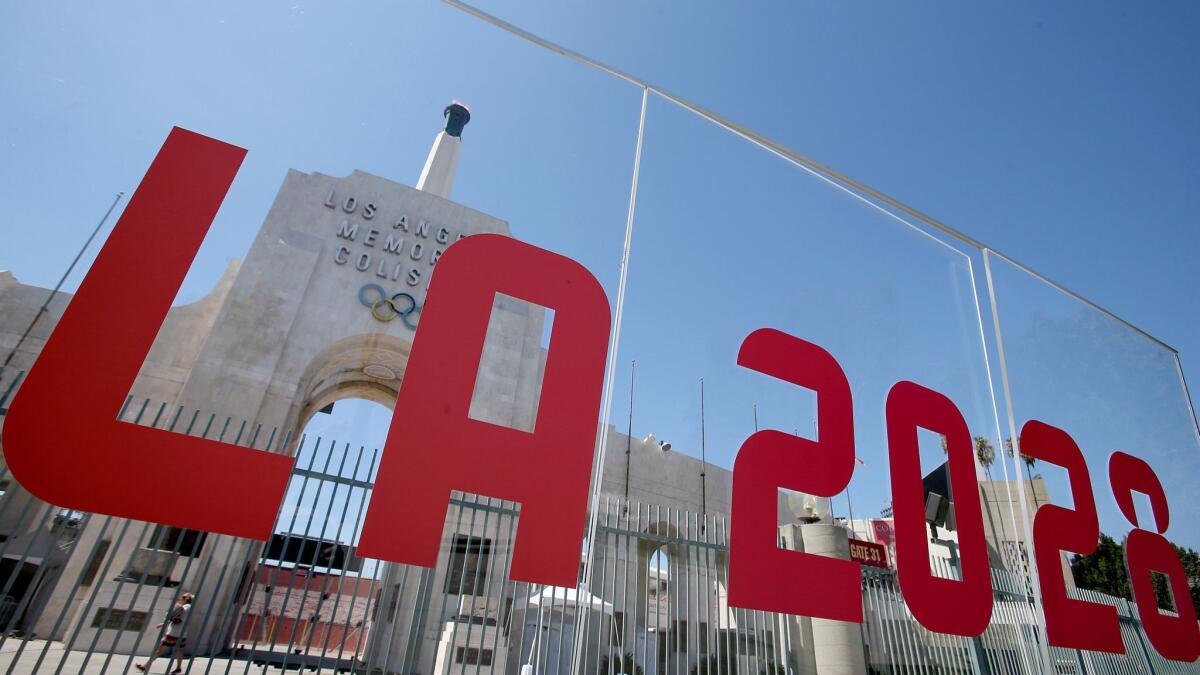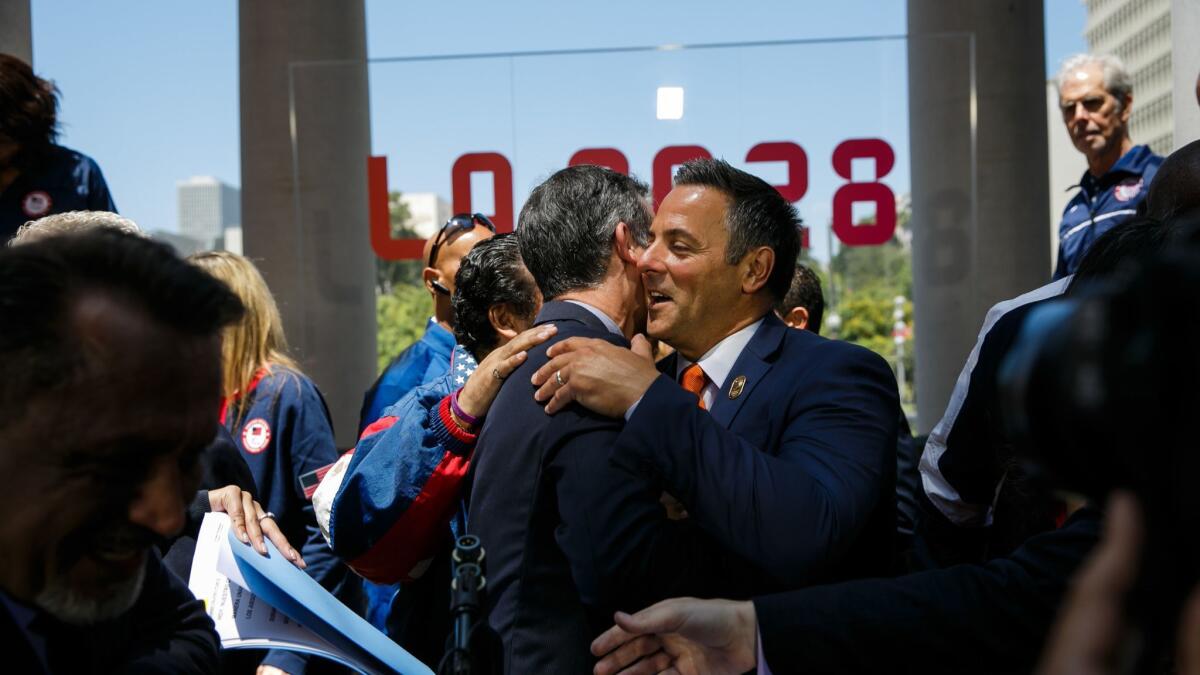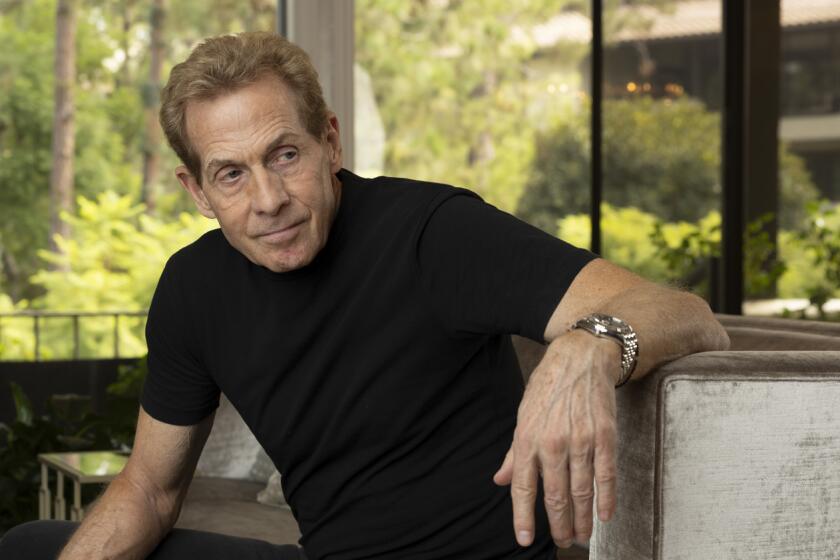L.A. 2028 Olympics officials hope new sponsorship strategy results in revenue boost

Facing pressure to deliver the 2028 Los Angeles Olympics on budget, local organizers have signed an unusual deal they hope will guarantee crucial revenue.
LA 2028 announced Wednesday that it will partner with NBCUniversal to sell media and sponsorship deals in tandem. Normally, organizers and broadcasters work separately, sometimes at odds with each other.
NBCUniversal has also made an undisclosed financial commitment to the host committee, a pledge that could ease concerns about LA 2028’s goal of reaching $2.5 billion in domestic sponsorships.
“This has not been done with a media partner before,” LA 2028 chairman Casey Wasserman said. “This is really unique.”
Though the host committee has sought to limit expenses by using existing venues such as Staples Center and the Rose Bowl, staging the 2028 Summer Games will cost $6.2 billion, according to the most recent estimate.
If LA 2028 cannot generate enough dollars, taxpayers would be left to pay the bill.
The L.A. City Council has agreed to serve as a financial backstop, and California legislators have similarly pledged up to $270 million in state tax dollars to cover any potential deficit.
Organizers have repeatedly insisted they can balance their budget — and perhaps finish with a surplus — through revenue streams that include ticketing and licensing. They also expect to receive approximately $2 billion from the International Olympic Committee’s global revenues. But selling those domestic sponsorships remains key.
When L.A. agreed to take the Summer Games in 2028, letting Paris go first in 2024, a big part of the agreement involved greater flexibility in making such deals.
Still, their $2.5-billion prediction is ambitious — even with Tokyo 2020 reporting a record $3 billion in sales — given a web of complex business relationships.
The IOC lays claim to global deals in a number of major categories, such as vehicles, audio-TV and non-alcoholic beverages. That leaves LA 2028, in conjunction with the U.S. Olympic Committee, to peddle sponsorships in other categories.
“It’s less clear what the sponsor will derive in benefits when [categories] are carved up in smaller parts,” said Robert Baade, an economics professor who studies Olympic finance at Lake Forest College in Illinois. “There’s much more risk.”
The relationship between host committee and domestic broadcaster can also be difficult in ways that go beyond both entities vying for the same pool of corporate marketing dollars.
A detergent company could pay the host committee to be an official domestic sponsor, plastering the LA 2028 and Olympic logos on its soap boxes. But when the Games begin, the broadcaster — offering exposure on television and other platforms such as live streaming — might have sold the first commercial to a rival company.
“If you have these two different organizations selling fundamentally the same thing, you add a whole layer of complexity,” said Victor Matheson, an economics professor at the College of the Holy Cross in Massachusetts. “They could certainly be at cross-purposes.”
Wasserman said he first approached NBCUniversal about addressing this dilemma when he ran into network executives at the 2018 Winter Games in Pyeongchang, South Korea. Negotiations over coordinated sales began in earnest last spring.
The U.S. has a history of staging fiscally responsible Games. L.A. had particular success in 1984 when Peter Ueberroth helped revolutionize sponsorship deals for the Olympic movement and left the city with a surplus of well more than $200 million.

Now, the two sides are betting that their partnership will look attractive to companies interested in getting a piece of the first Summer Games to take place on American soil in more than three decades.
“When you’re able to combine and amplify the media side and the sponsorship side, that’s when you’re able to offer all things to a brand,” NBCUniversal executive Linda Yaccarino said.
Joint sales could also ease issues that have arisen from L.A. being awarded the Games more than a decade in advance.
Though the unusual circumstances have provided more time to prepare, organizers were not allowed to begin pursuing deals until the beginning of the year. They face the challenge of selling sponsorships that do not begin until after next summer’s Tokyo Games, lasting eight years.
Tuesday’s announcement comes at a time when LA 2028 is continuing negotiations with Nike and other companies that could want both media and sponsorship agreements. Wasserman said top-tier deals have yet to be finalized but could be announced by summer.
“Our bid for the 2028 Games was one of the strongest in Olympic history, because we aren’t afraid to innovate,” said Mayor Eric Garcetti, who spearheaded the effort. “Now our organizing committee is thinking as boldly and creatively as ever.”
Sign up for our daily sports newsletter »
Follow @LAtimesWharton on Twitter
More to Read
Go beyond the scoreboard
Get the latest on L.A.'s teams in the daily Sports Report newsletter.
You may occasionally receive promotional content from the Los Angeles Times.











